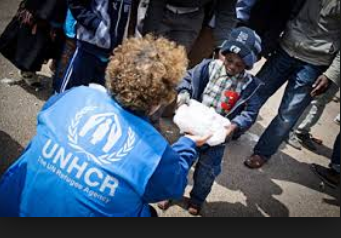UNHCR's local staff and partners who visit immigration detention centres say conditions are poor, with urgent needs for more medical help, improved ventilation and sanitation as well as basic relief items. With the rate of detention on the rise, overcrowding compounds already tough conditions.
In some centres, more than 50 people are crowded into rooms designed for half that number. Temperatures are on the rise, as are the mosquitos which could spread disease. At the request of local authorities, UNHCR is helping to ease the dire conditions and distributing soap, clothing and other items to detainees in eight centres.
There are some 36,000 refugees and asylum-seekers registered with UNHCR in Libya (though some may have moved on) and affected by the growing violence and lawlessness. The largest group are Syrians. But despite the volatile situation, UNHCR continues to help refugees and asylum-seekers, working through national staff and NGO partners.
"We run two community development centres in Tripoli and Benghazi and have also expanded outreach this year through a mobile medical and social team in Tripoli. We also run dedicated hotlines to help people get registered, receive cash assistance, renew documents, or who are in detention. We are setting up another hotline with the Libyan coastguard to receive search-and-rescue updates," UNHCR's Rummery said.
Meanwhile, UNHCR continues to deliver aid like mattresses, blankets, clothing and kitchen utensils to thousands of internally displaced Libyans, and is supporting municipal authorities to track displacement and assess needs. Some 400,000 Libyans have been displaced by various waves of violence, according to UN figures.
(Source: UNHCR)





